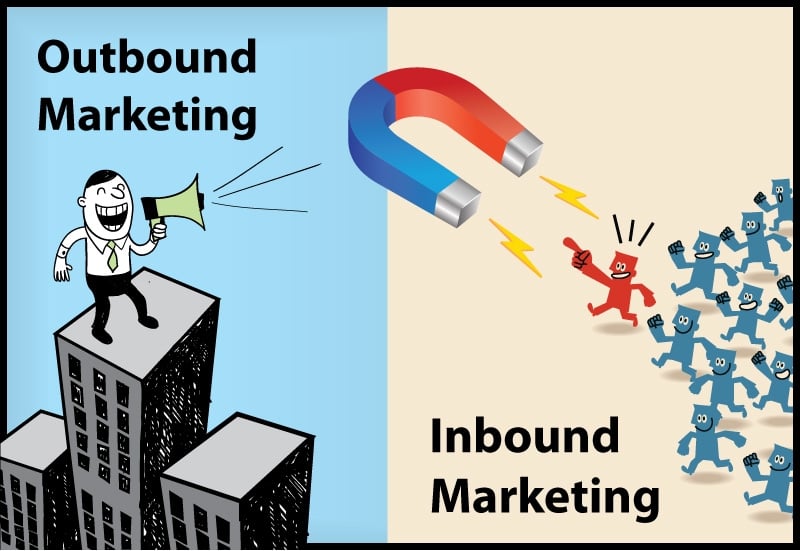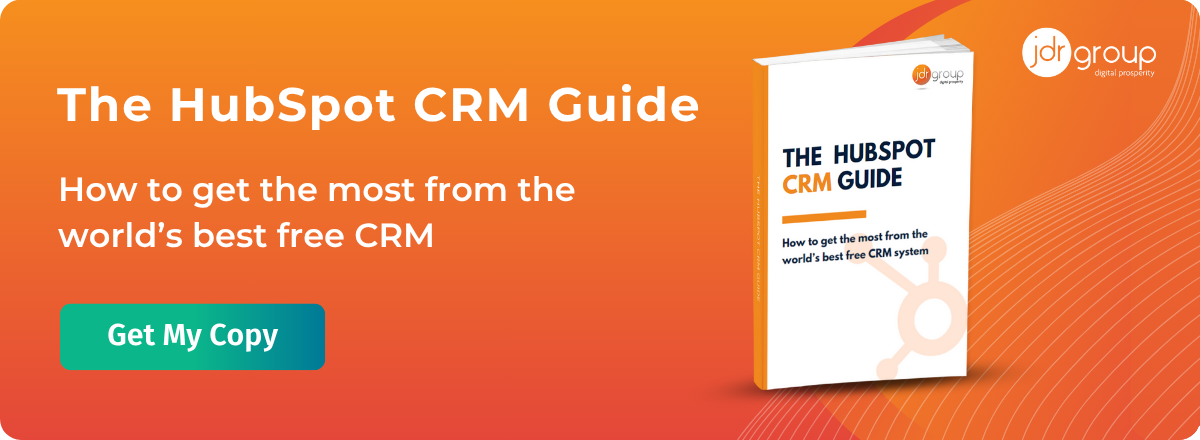Going Beyond Referrals: How Inbound Marketing Can Help Accountants Acquire New Clients
by Andrew Leamon on 01-May-2023 11:00:00

For decades, word-of-mouth referrals have been the primary source of new clients for accountancy businesses. However, the way in which customers now search for professional services has significantly changed, with Chartered Accountants having to adapt their service model to meet a primarily virtual audience. Online and self-serve accountancy systems, and virtual meeting modalities, have largely replaced, or at least supplemented – the traditional face-to-face accountancy model – and the way that sales are made has also changed as a result.
This shift in consumer behaviour has led a growing number of accountants to turn to inbound marketing as a more cost-effective and efficient way of acquiring new customers than referral marketing alone. This article will explain the benefits of inbound marketing for accountants, comparing it to traditional referral marketing, and explain why it can be a more valuable and cost-effective way of allocating your sales and marketing budget.
Leads And Conversions:
Inbound marketing generates more leads and conversions than referrals.
One of the main and most straightforward advantages of inbound marketing over the referral model is the volume of leads and conversions it generates. Inbound marketing is designed to generate increased web traffic and to convert an increased proportion of these visitors into inbound sales leads, and subsequently into customers.
In terms of the numbers game alone, it is always more effective than referral marketing. However, inbound is also a more effective way of converting customers for less cost. By creating personalised content to educate, inform, and address your target customers’ questions, you can attract more warm leads who are directly searching for specific accountancy services.
In contrast, referrals are typically passed along from existing contacts or clients, who may not have a strong understanding of your services before they get in touch. As a result, there is no guarantee that the referees will be a good fit for your business or even have a genuine interest in your services, and you may have to invest substantial time and effort in educating them to see the value of your proposition.
Cost Per Sale:
Inbound marketing is more cost-effective than referral marketing.
On the surface, referral marketing gives you ‘free leads’, but in reality, these are few and far between. Systematic referral marketing usually involves some kind of compensation or incentive for contacts to refer new business to you, such as discounts or value-added services, which can be costly in the long run. Inbound marketing, on the other hand, does not use discounts or monetary incentives to attract leads. Instead, you create and promote valuable content (for free) that benefits your target audience and establishes your accounting business’s authority and reputation. You can achieve this on a fairly modest budget, and this not only lowers your cost per sale but also builds increased trust and credibility among prospects, who are then more likely to choose you over competitors.
Credibility And Trust:
Inbound marketing helps establish you as an expert accountancy business.
In accountancy and professional services, trust and credibility are everything for potential clients. Customers are more likely to do business with an accountancy firm that they know and trust with their money and financial affairs. By providing extensive valuable information about your accounting services, tax laws, and financial management best practices, you can establish your business as a leading authority in your sector and local area.
Referral marketing can’t do this. Yes, you have the implied authority of the person making the referral, but with each lead, you must start from scratch to build your professional reputation and create a business case for your services.
Control:
Inbound marketing gives you more control over your brand identity and messages.
Referral marketing depends on existing customers to act as advocates for your brand, accurately explaining your services to their colleagues, friends, and associates. This essentially outsources your sales and marketing strategy to people without much familiarity with your brand, and no knowledge of your business goals and aspirations. This is one of the reasons why referral marketing is often so inconsistent in its results and hard to measure and monitor. Inbound marketing gives you more control over your brand identity and messages since it doesn’t depend on the actions of others, such as previous customers recommending your business. You’ll be able to use your published content to portray the specific messages and identity that you need to attract your ideal customers so that the people who get in touch with you already have a clear understanding of what you offer and the costs involved.
Find Out More
While referral marketing can be an effective source of sales for accountants, businesses looking for a more reliable and consistent source of leads should consider supplementing this with inbound marketing. An inbound marketing strategy can be scaled to your growth objectives and budget to give you the leads and sales you need to develop future success. To find out more, please call JDR Group’s Inbound Marketing Specialists today at 01332 343281.
Image Source: Pexels
- Inbound Marketing (SEO, PPC, Social Media, Video) (832)
- Strategy (368)
- Sales & CRM (197)
- Marketing Automation & Email Marketing (192)
- Business Growth (168)
- Website Design (162)
- Hubspot (141)
- Lead Generation (117)
- Google Adwords (100)
- Content Marketing (94)
- Conversion (53)
- Case Studies (49)
- News (47)
- Ecommerce (39)
- Webinars (36)
- SEO (27)
- AI (21)
- Events (19)
- LinkedIn Advertising (17)
- Video (17)
- Video Selling (15)
- Software training (13)
- Niche business marketing (11)
- The Digital Prosperity Podcast (10)
- Facebook Advertising (8)
- HubSpot Case Studies (7)
- Web Design Case Studies (1)
- February 2026 (9)
- January 2026 (12)
- December 2025 (15)
- November 2025 (6)
- October 2025 (17)
- September 2025 (16)
- August 2025 (14)
- July 2025 (14)
- June 2025 (5)
- May 2025 (19)
- April 2025 (15)
- March 2025 (13)
- February 2025 (13)
- January 2025 (8)
- December 2024 (2)
- November 2024 (4)
- October 2024 (21)
- September 2024 (4)
- August 2024 (8)
- July 2024 (14)
- June 2024 (16)
- May 2024 (25)
- April 2024 (15)
- March 2024 (18)
- February 2024 (5)
- January 2024 (10)
- December 2023 (6)
- November 2023 (10)
- October 2023 (13)
- September 2023 (12)
- August 2023 (14)
- July 2023 (13)
- June 2023 (14)
- May 2023 (15)
- April 2023 (13)
- March 2023 (14)
- February 2023 (13)
- January 2023 (15)
- December 2022 (13)
- November 2022 (6)
- October 2022 (8)
- September 2022 (22)
- August 2022 (15)
- July 2022 (13)
- June 2022 (16)
- May 2022 (14)
- April 2022 (16)
- March 2022 (17)
- February 2022 (11)
- January 2022 (8)
- December 2021 (6)
- November 2021 (7)
- October 2021 (11)
- September 2021 (10)
- August 2021 (7)
- July 2021 (7)
- June 2021 (4)
- May 2021 (4)
- April 2021 (1)
- March 2021 (3)
- February 2021 (5)
- January 2021 (4)
- December 2020 (7)
- November 2020 (6)
- October 2020 (5)
- September 2020 (9)
- August 2020 (18)
- July 2020 (17)
- June 2020 (17)
- May 2020 (10)
- April 2020 (21)
- March 2020 (24)
- February 2020 (21)
- January 2020 (12)
- December 2019 (23)
- November 2019 (12)
- October 2019 (14)
- September 2019 (16)
- August 2019 (15)
- July 2019 (13)
- June 2019 (6)
- May 2019 (8)
- April 2019 (4)
- March 2019 (2)
- February 2019 (2)
- January 2019 (2)
- December 2018 (3)
- November 2018 (24)
- September 2018 (11)
- August 2018 (9)
- June 2018 (3)
- May 2018 (6)
- April 2018 (14)
- March 2018 (12)
- February 2018 (16)
- January 2018 (15)
- December 2017 (15)
- November 2017 (18)
- October 2017 (23)
- September 2017 (19)
- August 2017 (28)
- July 2017 (27)
- June 2017 (25)
- May 2017 (18)
- April 2017 (17)
- March 2017 (16)
- February 2017 (17)
- January 2017 (14)
- December 2016 (21)
- November 2016 (27)
- October 2016 (25)
- September 2016 (16)
- August 2016 (20)
- July 2016 (19)
- June 2016 (14)
- May 2016 (20)
- April 2016 (24)
- March 2016 (22)
- February 2016 (28)
- January 2016 (27)
- December 2015 (28)
- November 2015 (19)
- October 2015 (9)
- September 2015 (12)
- August 2015 (5)
- July 2015 (1)
- June 2015 (10)
- May 2015 (3)
- April 2015 (11)
- March 2015 (14)
- February 2015 (15)
- January 2015 (12)
- December 2014 (2)
- November 2014 (23)
- October 2014 (2)
- September 2014 (2)
- August 2014 (2)
- July 2014 (2)
- June 2014 (7)
- May 2014 (14)
- April 2014 (14)
- March 2014 (7)
- February 2014 (2)
- January 2014 (7)
- December 2013 (9)
- November 2013 (14)
- October 2013 (17)
- September 2013 (3)
- August 2013 (6)
- July 2013 (8)
- June 2013 (4)
- May 2013 (3)
- April 2013 (6)
- March 2013 (6)
- February 2013 (7)
- January 2013 (5)
- December 2012 (3)
- November 2012 (2)
- September 2012 (1)
Subscribe by email
You May Also Like
These Related Blogs

Inbound Marketing Vs Outbound Marketing - Is Outbound Marketing Dead?
Marketing tactics to consumers and clients are changing rapidly. It’s not about asking, “Hey, do you want to buy this product or use these services?” …

Content Marketing VS Inbound Marketing: What's The Difference?
If you work in marketing I’m sure you will have heard the term Content Marketing VS Inbound Marketing. There is a lot of misunderstanding as to what t …

How To Use Effective Online Marketing Strategies To Get More Clients
Over the past decade we have witnessed an explosive supernova when it comes to the expanding world of digital marketing techniques. The sheer wealth o …




